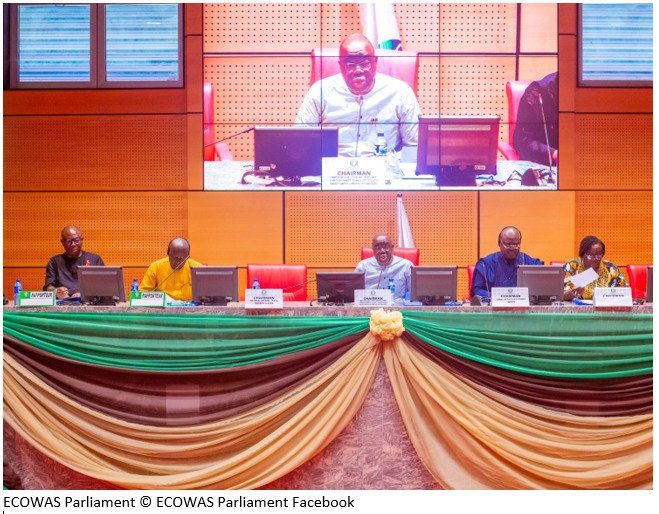FactCheck: Did ECOWAS Reject Partnership with Gambia to Establish Special Tribunal?
By Yusef Taylor, @FlexDan_YT
In July 2024, two of the country’s leading newspapers reported or published articles stating that the Economic Community of West African States (ECOWAS) rejected a partnership to establish a special tribunal in The Gambia to try perpetrators identified in the Truth, Reparations and Reconciliation Commission (TRRC).
Claim:
The Point Newspaper headline “Gov’t Confirms ECOWAS rejects partnership to establish Special Tribunal” and The Standard Newspapers’ headline “ECOWAS denies The Gambia’s hybridcourt to try Jammeh – not surprising” both dated July 8th and 9th , 2024 presents the notion that ECOWAS had made a final decision on rejecting the said partnership. Our FactCheck reveals otherwise.
The Gambia is currently in a state of Transitional Justice after the TRRC concluded its report in 2021 and recommended the prosecution of some 69 individuals for serious human rights violations. Unfortunately, the Gambia does not currently have the required laws to try some of the Crimes identified by the TRRC. In pursuance of this the government has progressed efforts to establish a Special Tribunal in partnership with ECOWAS that will prosecute crimes which occurred during the regime of former President Jammeh. However, recent headlines suggest that this is plan is currently at risk of being rejected.
FactCheck:
The Point Newspaper article highlights that “The Gambia government has confirmed that ECOWAS Parliament voted against the proposal of partnership with the ECOWAS Commission to establish a special tribunal for The Gambia to prosecute crimes committed under former President Jammeh”. This statement makes note of two different bodies, the ECOWAS Parliament and the ECOWAS Commission.
According to the ECOWAS Parliament website, the body was established in 1993 under Articles 6 and 13 of the ECOWAS Revised Treaty. It is “the Assembly of Peoples of the [West African] Community serving as a forum for dialogue, consultation and consensus for Representatives of the people of West Africa with the aim of promoting integration”. The ECOWAS Parliament makes model laws but States are not mandated to adopt them.
The ECOWAS Commission which is also based in Abuja, Nigeria is “headed by the President, assisted by a Vice President and five Commissioners” together with a Secretariat. “The ECOWAS commission is pre-occupied with the implementation of critical and strategic programmes that will deepen cohesion and progressively eliminate identified barriers to full integration”.
The ECOWAS Commission is the main implementing body of the ECOWAS and receives advice from the ECOWAS Parliament which it may or may not implement.
Solicitor General Hussein Thomasi, provided some clarifications on this when he said: “I know it’s been stated in some quarters that the decision or the statute establishing the special tribunal was rejected by the ECOWAS, that is not the case”.
“What happened was that the Mediation and Security Council of ECOWAS considered the statute but deferred it to its next meeting in December and wanted the ambassadorial meeting to first consider the statute, endorse it and then transmit it to the Mediation and Security Council. This is what happened,” said Solicitor General Thomasi.
“When considered by the ambassadorial meeting, it will now be transmitted to the mediation and Security Council. That’s the level of the ministers—ministers of foreign affairs and defense. Of course, they will deliberate on it and then send it to the authorit[y] of heads of state and government. So the process is still on,” he said.
Mr Salieu Taal © Askanwi
The former President of the Gambia Bar Association (GBA), Salieu Taal, also spoke on the matter at a recent engagement with stakeholders on the Ousman Sonko Trial and the verdict of 16th October 2024. According to Taal, the government is “waiting for the ECOWAS [Commission] meeting in December [2024] to go through the processes. All of you have heard that ECOWAS has rejected the court, that is not true. What happened was the ECOWAS Parliament gave an advisory opinion about the court. So, the ECOWAS Parliament really doesn’t have the mandate to approve or not to approve. For some reason the [ECOWAS] Commission sent it to [the ECOWAS Parliament] for an opinion and they didn’t like the idea”.
Verdict:
The headlines “Gov’t Confirms ECOWAS Rejects Partnership to Establish Special Tribunal” and “ECOWAS denies the Gambia’s hybridcourt to try Jammeh – not surprising” are both MISLEADING.
It would have been appropriate to clearly indicate “ECOWAS Parliament” and not only “ECOWAS” as was rightly reported by the Alkamba Times on July 5th, 2024 with the headline “ECOWAS Parliament Rejects Proposed Bloc’s Role in Gambia’s Special Tribunal”.
If the proposal is listed on the agenda of the 66th Ordinary Session of the Authority of Heads of State and Government, a decision would be made to approve/reject Gambia’s proposal for a Special Tribunal.
Given that this is yet to happen, the headlines are deemed to be MISLEADING.
This FactCheck was first published on FactCheckGambia.org in the link. https://factcheckgambia.org/fact-check-did-ecowas-reject-partnership-with-gambia-to-establish-special-tribunal/


